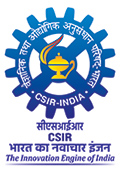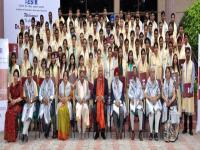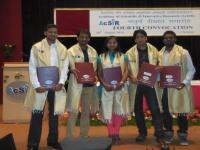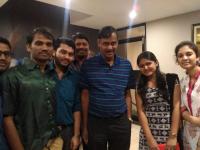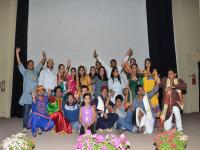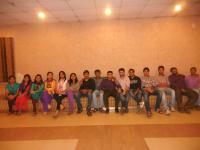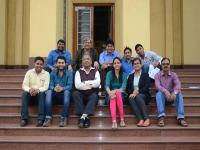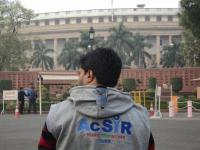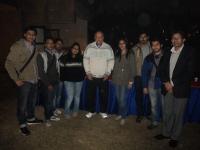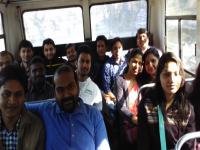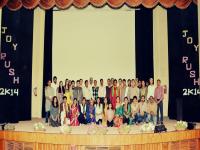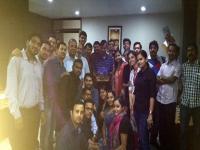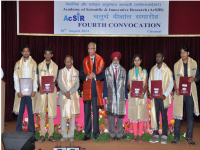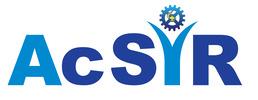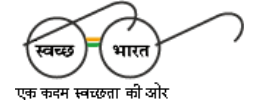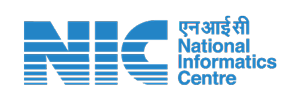AcSIR at CSIR-NML
Academic Program
The CSIR-National Metallurgical Laboratory (NML) is committed to fostering academic excellence alongside its renowned research and industrial consultancy. As part of its mission to develop skilled professionals and researchers in the fields of metallurgy and materials science, mineral processing, Ferrous and non-ferrous process metallurgy, Mechanical and Physical Metallurgy, surface engineering, analytical chemistry, magnetism and magnetic material, electromagnetic and optical sensors etc. NML offers the following academic programs in collaboration with Academy of Scientific and Innovative Research (AcSIR):
Integrated Dual-Degree PhD (IDDP) Program:
Qualifying degree: 4-year undergraduate degree in Engineering (such as BE/BTech/BS) with minimum 55% marks (without rounding off) or equivalent grade for General (UR)/General- EWS and minimum 50% marks (without rounding off) or equivalent grade for OBC (NCL)/SC/ST, Third Gender and Persons with Disability (PwD).
Mode of entry:
- Self-sponsored
OR
- Industry Sponsored candidates#: Endorsement (NOC) from the current employer is mandatory. (TENABLE AT ALL Associated Research Institutes)
** CSIR-NML offers a maximum of 5 (five) fellowships under CSIR JRF-GATE Scheme to students registered for the Integrated M.Tech.-PhD programme of AcSIR
PhD (Engineering):
Qualifying degree: Master’s degree in Engineering or Technology (after a four-year engineering/technology degree or with an integrated 5-year B.Tech./M.Tech. degree or equivalent) with minimum 55% marks (without rounding off) or equivalent grade for General (UR)/General-EWS and minimum 50% marks (without rounding off) or equivalent grade for OBC (NCL)/SC/ST, Third gender and Persons with Disability (PwD).
Mode of entry:
- Self-sponsored
OR
- Staff of AcSIR Associated Research Institutes: Project Assistants, Senior Research Fellows, Group-IV Scientists and Group-III Technical Staff of CSIR, and other Associated Research Institutes of AcSIR. NOC from the current employer is mandatory. (TENABLE AT ALL AcSIR Associated Research Institutes except ICMR Institutes)
OR
- Industry Sponsored candidates#: Endorsement (NOC) from the current employer is mandatory. (TENABLE AT ALL AcSIR Associated Research Institutes)
PhD Sciences (Physical Sciences, Chemical Sciences)
Qualifying degree: Master’s degree in science with minimum 55% marks (without rounding off) or equivalent grade for General (UR)/General-EWS and minimum 50% marks (without rounding off) or equivalent grade for OBC (NCL)/SC/ST, Third gender and Persons with Disability (PwD).
Mode of entry:
- National-level fellowship: The applicant should have a valid National-level Fellowship (JRF/ SRF of any funding agency, e.g. CSIR, ICMR, UGC, DBT, DST, etc.) or any other equivalent fellowship like DBT-BET, INSPIRE, RGNF, etc. (Tenable At All AcSIR Associated Research Institutes except ICMR Institutes).
OR
- Staff of AcSIR Associated research institutes: Project Assistants, Senior Research Fellows, Group-IV Scientists and Group-III Technical Staff of CSIR, and other Associated Research Institutes of AcSIR. NOC from the current employer is mandatory. (Applicable to all AcSIR Associated Research Institutes except ICMR Institutes)
OR
- Industry Sponsored candidates#
Endorsement (NOC) from the current employer is mandatory. (TENABLE AT ALL AcSIR Associated Research Institutes)
Eligibility for Project Assistants: -
- Only those Project Assistants working in the Institutes may be considered for admission to AcSIR Ph.D. program who have been in temporary employment as a Project Assistant in a sanctioned R&D project in the same Institute for at least one year (one year will be determined as on the last date of admission confirmation by payment of fees, as notified by AcSIR for each Academic Session in which the Project Assistant intends to seek admission for Ph.D..), and can only apply with the prior permission of the PI of the project and concurrence of the Director of the Institute;
- Project Assistants who have qualified any PhD qualifying National level Examination [NET (Category 2 and 3) as per public notice no.F.-1(UGC-NET Review Committee)/2024(NET)/140648 dated March 27, 2024, GATE, BET, JEST, etc.], even without eligible fellowship, will be exempted from the eligibility criteria of having one publication;
- Project Assistants who have not qualified any National level Examination, will need to have at least one publication in a SCI journal with substantial research contribution as a co-author by the day of application;
- The Project Assistants, who are being considered for admission to the AcSIR Ph.D. program, must fulfil the eligibility conditions. The Screening and Selection committee, constituted as per rules of AcSIR, must evaluate the knowledge of the candidate in the subject and research capabilities critically;
- The selection shall be made on the basis of an oral examination by the Selection Committee constituted at the Institute, which shall be considered equivalent to a written examination;
- On completion of their tenure of the R&D project from which the student was drawing his/her fellowship, the student may be given an option to continue in the Ph.D. program without a fellowship, with approval of the Director of the concerned Institute, failing which their admission in the Ph.D. program will stand cancelled.
PhD Courses Offered
Course 1(a) RESEARCH METHODOLOGY COURSE
|
ACSIR-NML-RM |
Research Methodology |
Credits 4 |
|
Course Content |
|
|
|
Safety and Behavior at Workspace, Laboratory and Institutional Campus |
General safety and accident prevention guidelines, Good personnel safety practices, Laboratory safety practices (Do’s and Don’ts), Fire safety principles and fire handling, Care in handling chemicals, Understanding materials safety data sheet (MSDS), Storing and indexing of materials & chemicals, Disposal of materials, chemicals and biological wastes, First aid, Reporting accidents and requisitioning help, Combating accidents. Awareness about members of the Institutional Safety Committee and emergency contact numbers. Lab bench co-operation with colleagues and co-workers, cultivating practice of collectivism, shared responsibilities and team-spirit among fellow researchers, Advancing culture of scientific sharing and discussion in campus and lab. |
|
|
Research Problem Identification and Research Design/Plan |
Scientific methods, Types of reasoning (Logics) - Induction – Deduction – Abduction, Identifying a topic/area of research, Reviewing literature, Identifying a question to be answered/solution of a problem to be sought, Critically weighing investment (time, money and efforts) to reward (size and scale of answer/solution), Finalizing the research question/problem to be worked on, Cross-disciplinary thoughts and inter-disciplinary research approaches of addressing the question. Design of experiment/research work process and its implementation, Serendipity research. |
|
|
Good Experimental, Observational and Data Analysis including Computer Applications |
Maintenance of laboratory records & e-Note books, Management of data and self-navigation of research project and academic program progress (objectives, milestone as well as timeline compliance), Data integrity & archiving of observational data for re-tracing, Basic mathematical and statistical treatments of data for appropriate/rational interpretation, Reporting data in inference perspectives, Common computational tools like Process flow diagram, Chemical structure drawing, statistical analyses, Data tabulation and figure presentation(graph, bar diagram, Venn Diagram, heat maps etc.) |
|
|
Intellectual Property, Patent Database Search and Patent Writing |
Innovation, Intellectual Property Rights (IPR), Pre-IPR system of intellectuality/tradeprotection:Secrecy/Tradeguilds/Cartels,Basicforms of IPRs: ─ Patent, Copyright, Trademark, Designs, Evolution of IP statutes, Major patent databases/offices, CSIR-TKDL, Searching and indexing of patents from different databases, IPR for new technologies, Process patent versus product patent, Art of writing a patent/innovation and claims, Preliminary patent, White space mapping, CSIR &its patents strength. |
|
|
Writing & Communication of Research Results and Inferences |
Scientific writing (including Language proficiency), State-of-the-art scientific literature comprehension, Art and ethics of writing research report/paper, writing of an abstract for scientific community and general public, Skills of making PowerPoint presentations, Art of web-meeting interactions & presentations using latest video-meeting modes. Letter writing and official correspondence. |
|
|
Analytical Tools and Techniques in Research -A General Cross- disciplinary Exposure |
Flexibilityofthecontentsbutitmustbewithintheframeworksofdifferent faculties of AcSIR (Biological Sciences, Chemical Sciences, Physical Sciences, Engineering Sciences, and Mathematical & Information Sciences). Further, the course content should be of basic level to serve the purpose of learning and awareness in a balance of breadth and depth of topics for the students with different backgrounds/interests with respect to subjects and faculties. (A brief of the tools and techniques to be covered by the Teaching Faculty shall be circulated to the students in advance and the same also shall be uploaded on AcSIR Website) |
|
|
CSIR Guidelines (2020) for “Ethics in Research and in Governance” Adopted by AcSIR. |
Full awareness about the guidelines (https://acsir.res.in/wp-content/uploads/2020/08/OM-Ethics-Guidelines.pdf) and their compliance and practice. |
|
|
|
||
|
References:
|
||
Course 1(b): RESEARCH PUBLICATION AND ETHICS
|
AcSIR-NML-RPE |
Research and Publication Ethics |
Credits 2 |
|
Course Content |
|
|
|
Theory |
||
|
Philosophy and ethics |
1. Introduction to philosophy: definition, nature and scope, concept, branches 2. Ethics: definition, moral philosophy, nature of moral judgments and reactions |
|
|
Scientific conduct |
1. Ethics with respect to science and research 2. Intellectual honesty and research integrity 3. Scientific misconducts: Falsification, Fabrication, and Plagiarism (FFP) 4. Redundant publications: duplicate and overlapping publications, salami slicing 5. Selective reporting and misrepresentation of data |
|
|
Publication ethics |
1. Publication ethics: definition, introduction and importance 2. Best practices / standards setting initiatives and guidelines: COPE, WAME, etc. 3. Conflicts of interest 4. Publication misconduct: definition, concept, problems that lead to unethical behavior and vice versa, types 5. Violation of publication ethics, authorship and contributor ship 6. Identification of publication misconduct, complaints and appeals 7. Predatory publishers and journals |
|
|
Practice |
|
|
|
Open access publishing |
1. Open access publications and initiatives 2. SHERPA/RoMEO online resource to check publisher copyright & self archiving policies 3. Software tool to identify predatory publications developed by SPPU 4. Journal finder / journal suggestion tools viz. JANE, Elsevier Journal Finder, Springer Journal Suggester, etc. |
|
|
Publication Misconduct |
A. Group Discussions (2 hrs.) 1. Subject specific ethical issues, FFP, authorship 2. Conflicts of interest 3. Complaints and appeals: examples and fraud from India and abroad B. Software tools (2 hrs.) 1. Use of plagiarism software like Turnitin, Urkund and other open source software tools |
|
|
Databases and Research Metrics |
A. Databases (4 hrs.) 1. Indexing databases 2. Citation databases: Web of Science, Scopus, etc. B. Research Metrics (3 hrs.) 1. Impact Factor of journal as per Journal Citation Report, SNIP, SJR, IPP, Cite Score 2. Metrics: h-index, g index, ilO index, altmetrics |
|
Course 2: INTER-DISCIPLINARY/ CROSS DISCIPLINARY (2 Credits)
PhD Coursework
|
Course Code |
Course Title |
Credits |
|---|---|---|
|
AcSIR-31-ID-001 |
1. Introduction to Materials Inter-atomic Interactions & Materials; Solid state of Material Bonding in solids Atoms in a Solid Material: Basic Concepts of Crystallography, Concept of reciprocal lattice in structure determination. Packing of atoms in 3d-space. Defects in solids. Phases and concept of phase transformation Diffusion and Diffusion Less Transformations. Concept of Mechanical behavior of Materials.
|
1 Credit
|
|
AcSIR-31-ID-002 |
2. Kinetics of Metallurgical Processes
Introduction to Kinetics, Kinetics of homogenous and heterogeneous chemical reactions. Empirical and semi-empirical kinetics. Non-isothermal kinetics. Electrochemical kinetics. Mass transfer in solid, fluid and at interface. Application of mass transfer to reaction kinetics in heterogeneous systems, Nucleation and growth.
|
1 Credit
|
|
AcSIR-31-ID-003 |
3. Advanced Manufacturing
Casting and solidification; Semi-solid processing, Welding and joining technology: Metal working processes; Forging, rolling, extrusion, wire drawing; Powder processing, Principles of metal forming; Deformation maps; Workability of materials; Sheet metal forming, Forming limit diagram; Thermomechanical processing.
|
1 Credit
|
|
AcSIR-31-ID-004 |
4. Advanced Mineralogy
Introduction to Minerals, Crystallography, Optical Mineralogy, Atomic Substitution, Solid Solution, Polymorphism, Isomorphism, Silicate structures, Descriptive Mineralogy, Different Mineral Groups: Silicates (Olivine, Pyroxene, Amphibole, Mica, Feldspar, Garnet), Oxides, Sulfides, Mineral Associations, Mineral Genesis, Process Mineralogy
|
1 Credit
|
|
AcSIR-31-ID-005 |
Mathematical Modelling and Numerical Analysis-1 Introduction to Mathematical Modeling, Introduction to basic mathematics and statistical approach, Introduction to Differential Equations, Modeling with First-Order Differential Equations, Modeling with Higher-Order Differential Equaiions, The Laplace Transform, Numerical Solutions of Ordinary Differential Equations, Partial Differential Equations and Solution
|
1 Credit
|
|
AcSIR-31-ID-006 |
6. Waste Processing & Recycling
Introduction to waste processing and environmental management, Waste generation, its recycling and management (Solid & Liquid): Wastes from mining and mineral industries, Wastes from iron and steel (including ferro-alloys) industries, Wastes from non-ferrous metal industries : such as Aluminum, Copper, Lead, Zinc, Titanium and Chromium. Waste generation from power plants and their recycling status, Bulk utilisation of slag and other wastes using eco-friendly processes. Metallic wastes from non-metallurgical sectors : home appliances and others such as E-waste, Spent batteries, Spent catalysts , Toxicological characterization of liquid effluents, Toxicological characterization of solid wastes Values from wastes – High value materials synthesis |
1 Credit
|
|
AcSIR-31-ID-007 |
7. Advanced Mechanical Property Characterization
Multiaxial Fatigue, High strain rate material testing practices; Indentation creep; Dynamic Fracture toughness; Creep-fatigue interaction; Small specimen testing practices.
|
1 Credit
|
Course 3: ADVANCED COURSES (6 Credits)
|
Course Code |
Course Title |
Credits |
|---|---|---|
|
AcSIR-31-ES-AD-001 |
1. Tools and Techniques of Materials Characterisation
Basics of materials Characterization Principles of optics & optical microscopy & stereology, Electron microscopy (SEM & TEM), X-ray Diffraction & crystallographic analysis, analytical electron microscopy, Advanced characterization techniques
|
(3 Credit) |
|
AcSIR-31-ES-AD-002 |
2. Mathematical Modeling and Numerical Analysis -2
v Multi-scale Simulation System. v Basic Concepts of Length and Time Scales. v Intermolecular Interactions and Potential Energy Surfaces. v Theory of Ensembles, Phase Transitions and Relaxation Phenomena. v Simulation Methodology: Ø Density Functional Theory (DFT), Ø Molecular Dynamics (MD), Ø Phase Field (PF), Ø Computational Fluid Dynamics (CFD) Ø Finite Element Method (FEM). v Introduction and application of QUANTUM ESPRESSO, LAMMPS, DLPOLY, MICRESS, OPEN-PHASE, ANSYS, MATLAB simulation software.
|
(3 Credit)
|
|
AcSIR-31-ES-AD-003 |
3. Advanced Metallurgical Thermodynamics
Introduction to Thermodynamics, First Law of Thermodynamics and related thermodynamics laws, second law of thermodynamic and related properties. Third law of thermodynamics and related issues. Concept of free energy, standard state etc. Fugacity, activity, concept of standard state. Equilibrium constant involving gas and condensed phases. Dependence of equilibrium constant and free energy on temperature. Thermodynamics of solution partial molar quantities, Route's law, Henry's law, Alternative standard state, Sieverts law, Mixing, excess functions, Gibbs Duhem equation, and regular solution involving multi component systems. Ellingham diagram and its application in metallurgical system. Phase equilibria, Construction of binary and ternary phase diagram. Concept of computation thermodynamics. Application of Computational thermodynamics using thermocal.
|
(3 Credit) |
|
AcSIR-31-ES-AD-004 |
4. Mineral Processing
Mineral characterization, sampling, crushing and grinding, size classification, gravity concentration, magnetic and electrostatic separation and their application in mineral industries, surface chemistry and froth flotation principles, dewatering techniques, size enlargement processes, material balance and data reconciliation.
|
(3 Credit) |
|
AcSIR-31-ES-AD-005 |
5. Principles of Physical Metallurgy
Crystal structures and defects in solid; Diffusion; Thermodynamics and kinetics of transformations; Equilibrium phase diagram; Solidification; Solid state phase transformations; Strengthening mechanism; Engineering Alloys.
|
(3 Credit)
|
|
AcSIR-31-ES-AD-006 |
6. Microstructural Engineering
Evolution of Microstructures, microstructural instability; recovery, recrystalization and grain growth, Thermo-mechanical treatment and evolution of textures. Grain Boundary Characterization; Heat treatment methodology; Structure-property processing correlations.
|
(3 Credit) |
|
AcSIR-31-ES-AD-007 |
7. Mechanical Behaviour of Materials
Introduction to simple concepts of stress and strain tensor; Elastic stress-strain relationship; Strain energy; Mohr’s circle; Plastic yielding of material; Yield point; Yield criteria; Yield locus; Flow curve, Concept of crystal geometry; Lattice defects; Modes of deformation: slip and twinning; Critical resolved shear stress for slip; Slip in a perfect lattice; Slip by dislocation movement; Stacking faults; Fundamentals of indentation hardness; Brinell, Meyer, Vicker, Rockwell hardness; Hardness conversion; Relationship between hardness and flow curve; Hardness at high temperature; Engineering stress-strain curve; True stress-strain curve; Strength and ductility measurement in a tension test; Effect of strain rate/temperature on tensile behaviour; Necking criteria; Notched bar and drop weight impact tests; Transition temperature curves; Instrumented impact testing; Introduction to fracture mechanics based design, creep and fatigue behavior of materials.
|
(3 Credit) |
|
AcSIR-31-ES-AD-008 |
8. Advances in Non-Ferrous Metal Extraction
Fundamental and applied aspects of pyrometallurgy, hydrometallurgy and electrometallurgy: Pyrometallurgy : Standard Free energy Diagram, Predominance area diagram and Ternary diagram with reference to non-ferrous metal extraction; Pre-treatment (drying, calcination, roasting, etc.), Halidation, Smelting, Metallothermic reduction. Hydrometallurgy: Thermodynamics and kinetics of hydrometallurgical processes, leaching (including pressure oxidation, bio-oxidation), cementation, precipitation, ion exchange and solvent extraction. Electrometallurgy : Principles of electrochemistry, Cells and thermodynamic relations, electrowining, electrorefining, Molten salt electrolysis. Process selection for extraction of non-ferrous metals Outline of major competing routes of metal extraction from their ores. Limitations and factors influencing the choice of extraction and refining process i.e. the scientific and technological analysis of extraction processes. Metal Extraction and refining of metals viz.: Aluminum, Copper, Lead, Zinc, Magnesium, Titanium, Uranium and Rare earth metals
|
(3 Credit) |
|
AcSIR-31-ES-AD-009 |
9. Principles and Advances in Iron Making Principles of Iron making, Techniques of agglomeration (sintering and pelletization), Raw materials characterization (RI, RDI, Swelling index, Tumbler, shatter), BF iron making process and modeling, Sponge iron making (coal base, gas base). Alternative routes of iron making (COREX, HISMELT).
|
(3 Credit) |
|
AcSIR-31-ES-AD-010 |
10. Principles and Advances in Steel Making Principles of steel making, Different processes of steel making, Secondary steel making, Ingot casting and continuous casting, Electric processes (EAF and induction furnace), alloy steel making
|
(3 Credit) |
|
AcSIR-31-ES-AD-011 |
11. Corrosion & Control Interaction of metals with environments, formation of electrical double layer at metals - environments interface, mixed potential theory of corrosion, Stearn-Geary and Tafel equations, stress assisted corrosion and cracking , principles involved in controlling corrosion, Development of corrosion resistant alloys and materials, protective coatings, cathodic andanodic protection, passivity, Pourbaix diagram for metals and alloys, Corrosion inhibitors.
|
(3 Credit) |
|
AcSIR-31-ES-AD-012 |
12. Coating Technology Thin Films: Definition, nucleation and growth of thin films, Application of thin films. Processing of thin films: PVD, PECVD, electron beam evaporation, RF and DC sputtering, Magnetron sputtering, laser ablation. Plasma diagnostics by langmuir probe and OES. Influence of thickness, power, pressure, substrate, temperature and substrate target distance on the growth and microstructure of thin films. Mechanical, adhesion behavior and measurement of thin films, magnetic, optical, texture properties of thin films, method of evaluation of thin films. Surface chemistry and evaluation of thin film; Advanced Patterning Techniques of thin films for devices: lithography, wet chemical, electron beam, laser; Problems and issues of thin films.
|
(3 Credit) |
Chemical Sciences
Course 2: INTER-DISCIPLINARY/ CROSS DISCIPLINARY (2 Credits)
|
Course Code |
Course Title |
Credits |
|---|---|---|
|
|
1. Introduction to Materials
Basic concepts of crystallography, Bonding in atoms in a solid material, Design of nanomaterial and porous materials, Magnetic materials, Electronic materials, Different chemical and thin film techniques for materials synthesis. Properties analysis of materials, Application of materials: Sensor, Magnet, Energy generation and storage devices.
|
1 Credit
|
|
|
Mathematical Modelling and Numerical Analysis -2
Multi-scale Simulation System Basic Concepts of Length and Time Scales Intermolecular interactions and Potential Energy Surfaces Theory of Ensembles, Phase Transitions and Relaxation Phenomena. Simulation Methodology : Density Functional Theory (DFT), Molecular Dynamics (MD), Phase Field (PF), Computational Fluid Dynamics (CFD), Finite Element Method (FEM), Introduction and application of QUANTUM ESPRESSO, LAMMPS, DLPOLY, MICRESS, OPEN-PHASE, ANSYS, MATLAB simulation software
|
1 credit |
|
|
Metallurgical Waste Processing and recycling
General introduction to waste processing and environmental management, Waste generation and chemistry behind its recycling and management (solid & Liquid), Wastes from mining and mineral industries.Wastes from iron and steel (including ferro-alloys) industries, Wastes from non-ferrous metal industries such as Aluminum, Copper, Lead,Zinc, Titanium and Chromium. Bulk utilization of slag and other wastes using eco-friendly processes. Metallic wastes from non-metallurgical sectors: home appliances and others such as E-waste, Spent batteries, Spent catalysts, Toxicological characterization of liquid effluents, Toxicological characterization of solid wastes, Values from wastes - High value materials synthesis
|
1 credit |
|
|
Data Science and Analytics
Introduction to Data Science, Introduction to Big Data, Theories in Data Science, Big data technologies, Methods of Data Collection and Cleaning, Python Fundamentals, Programming with Python, Python for Data Science, Visualization in Python, Data Manipulation & Visualisation, Introduction of R fundamentals, Introduction to Machine Learning, Introduction to Artificial Intelligence, Models for Regression & Classification, Learning types, Support Vector Machine, Deep Learning.
|
1 credit |
|
|
Catalysis of Chemical Process
Course will include fundamental aspects of catalysis. Types of catalysis like homogeneous, heterogeneous catalysis, biocatalysis & Photocatalysis. Different class of catalysts - Bulk catalysts, supported catalysts, phase transfer catalysts, mixed agglomerate catalysts. Importance of porous materials & characterization of catalyst. Established mechanism of catalytic process and their role in modern industrial process. Recent development and challenges in catalysis.
|
1 credit |
|
|
Advanced Mechanical Property Characterisation
Multiaxial Fatigue, High strain rate material testing practices; Indentation creep; Dynamic Fracture toughness; Creep-fatigue interaction; Small specimen testing practices'
|
1 credit |
Course 3: ADVANCED COURSES (6 Credits)
|
Course Code |
Course Title |
Credits |
|---|---|---|
|
|
Material Characterisation Tools and Techniques Basics of materials Characterization Principles of optics & optical microscopy & stereology, Electron microscopy (SEM & TEM), X-ray Diffraction &; crystallographic analysis, analytica electron microscopy, Advanced characterization techniques Basic concept of Spectroscopy and its application , Basic principles of Advance analytical technique i.e. AAS, OES, XRF,UV-Vis Spectrocopy, IR & Raman Spectroscopy, ICP-MS |
3 credit |
|
|
Advanced Chemical Thermodynamics Review of Classical Thermodynamics: Fundamental principles of thermodynamics, Concept of entropy, Properties of Gibbs free energy Thermodynamic properties of pure substances and mixtures, their estimation and correlation; Stability and equilibrium criteria for homogeneous and heterogeneous systems Introduction to Statistical Thermodynamics: Statistical foundations, Molecular partition function, Boltzmann distribution Thermodynamics of Irreversible Processes |
3 credits 3-0-0-3 |
|
|
Advanced Applied Electrochemistry Fundamental of electrochemical reactions - Thermodynamics and kinetics of electrochemical reactions - Aqueous corrosion, corrosion inhibitors and anticorrosion barrier coatings - Types of electrochemical methods of corrosion analysis: Potentiodynamic polarization & Electrochemical Impedance Spectroscopy - Basics of electroplating and electroless plating, electrolysis cells, and electrowinning. Introduction of various Electrochemical energy harvesters and associated harvesting mechanisms related to hydrogen energy, solar energy, energy from bio-waste, Piezoelectricity, and thermoelectric generators. Basics of energy storage systems - supercapacitors and batteries: types, components, charge storage mechanisms, selection of electrodes and electrolytes, fabrication of electrodes and devices - Introduction to modern battery systems including sodium and potassium ion batteries, and magnesium ion batteries. Future prospects of energy storage systems. |
3 credits |
|
|
Surface Chemistry Fundamentals of surface science: Surface tension, contact angle, super-hydrophobicity, surfactants (basics, micelles), emulsions and microemulsions, Adsorption, Isotherms & porosity. Surface functionalisation Conventional surface modifications; Role and estimate of surface roughness; hot dipping, Electrodeposition/ plating; Surface modification of metalic surface (Passivation, conversion coatings, corrosion inhibitors); Surface modification using liquid bath (phosphating, chromating); Surface modification using gaseous medium (Nitriding, carbonitriding). Surface coating techniques: Polymeric coatings, Paints (types, application methods); Thin Film Coatings (Thermal evaporation, PVD and CVD, Sputter coating, Thin film for wear application). Characterization of surfaces: Measurement of coatings thickness; porosity, adhesion & chemicalenvironment by XPS. Functional Coatings & Applications: Functional and nano-structured coatings and their application (self-healing, self-cleaning, ice-phobic coatings). |
3 credits |
|
|
Materials for Energy Basic principleand design of materials for energy application,Synthesis techniques of energy materials (chemical, hydrothermal, solvo-thermal, sol-gel, microwave, sonochemical, sputtering, CVD), Methodology for surface modification of energy materials, Materials for energy generation systems: solar cells, fuel cells. Materials for hydrogen technology (production and storage), Piezoelectric and thermoelectric materials, Materials for energy storage: battery, capacitor and supercapacitor, Smart materials for improved energy generation and storage systems. |
3 credits |
|
|
Computational Chemistry Basic concepts and Postulates of Quantum mechanics, Quantization of Angular Momentum, Perturbation theory, Molecular orbital and Valence bond theories, Hamiltonian operator, Schrodinger equation, Born- Oppenheimer approximation, Hohenberg-Kohn theorem, Hubbard Model, Local Density Approximation, Plan wave, Pseudopotentials, Density functional theory, ab initio calculations on molecular systems Self- consistent field, Density of State, Fermi energy, Band structures, Charge equilibrations, Bond order dependent force field, Nose-hoover thermostat, Berendsen thermostat, Reactive Molecular Dynamics Simulations. |
3 credits |
Physical Sciences
Course 2: INTER-DISCIPLINARY/ CROSS DISCIPLINARY (2 Credits)
|
Course Code |
Course Title |
Credits |
|---|---|---|
|
AcSIR-31- ID-003 |
Introduction to Materials Inter-atomic Interactions in materials; Atomic bonding in materials; basic concepts of basic crystallography, concept of reciprocal lattice in structure determination; packing of atoms in 3d- space. Defects in solids. Concepts of band structure, Metals, semiconductors and insulators, dielectrics, paraelectric, ferroelectric, piezoelectric and pyroelectric materials, Concept of phase and concept of solid solute on and alloys ; Phase diagrams and Gibbs phase rule, example of binary and ternary phase diagrams; Diffusion and phase transformation in solids, diffusional and diffusionless phase transformations; Mechanical and magnetic behavior of Materials. |
3 Credits |
|
AcSIR-31-ID-008 |
Mathematical Physics Matrix and Tensors, Eigenvalue and Eigenfunction problems. Vector analysis and vector calculus fundamentals, linear and curvilinear coordinates, surface and volume integrals, complex variables basics, complex integrals, Z transform Ordinary Differential Equations: First order, second order (linear and nonlinear) differential equations and high order linear differential equations Partial Differential Equations: Separation of variables method, Laplace equation, solutions of one dimensional heat and wave equations. Numerical Methods: Solution of a system of linear equations by L-U decomposition, Gauss-Jordan and Gauss-Seidal Methods. Newton's interpolation formulae, Newton- Raphson method, numerical integration by trapezoidal rule, Simpson's rule and Gaussian quadrature, numerical solutions of first order differential equation by Euler& method and Runge-Kutta method. Introduction to finite difference (FDM) and Finite element (FEM) methods. Solving mathematical problems using MATLAB & MATHEMATICA |
1 Credit |
|
AcSIR-31-ID-009 |
Physics of deformation in materials Introduction to simple concepts of stress and strain tensor; Elastic stress-strain relationship; Basics of elastic and plastic deformation in materials, Modes of deformation: slip and twinning; Dislocations slip and various slip systems in materials, relations with crystallography, Stacking faults and dislocations; Critical resolved shear stress for slip; Strain energy; Mohr’s circle; Plastic yielding of material; Yield point; Yield criteria; Yield locus; Flow curve, Concept of crystal geometry; Fundamentals of indentation hardness; Brinell, Meyer, Vicker, Rockwell hardness; Hardness conversion; Relationship between hardness and flow curve; Hardness at high temperature; Engineering stress-strain curve; True stress- strain curve; Strength and ductility measurement in a tension test; Effect of strain rate/temperature on tensile behaviour; Necking criteria; Notched bar and drop weight impact tests; Transition temperature curves; Instrumented impact testing; Introduction to fracture mechanics based design, creep and fatigue behaviour of materials. |
1 Credit |
Course 3: ADVANCED COURSES (6 Credits)
|
Course Code |
Course Title |
Credits |
|---|---|---|
|
AcSIR-31-PS-AD-001 |
Advanced X-Ray Crystallography Symmetry and periodicity of crystals, Bravais lattices, Point groups and space groups, crystal classes and crystal system, Miller indices, Reciprocal lattice, Scattering factor, Stereographic projection, Basics of X-rays, Production and detection of X-rays, basics of X-ray diffraction, Diffractometer measurements, Diffracted intensity from crystals,Determination of crystal structure, Precise lattice parameter determination, structural simulation by Rietveld refinement, Qualitative and Quantitative phase analysis, Diffraction line broadening analysis, Crystallite size, lattice defects and determination of lattice strain, X-ray diffraction analysis of residual stress and crystallographic texture. |
3 Credits |
|
AcSIR-31-PS-AD-002 |
Physics of Thin Films Introduction to thin films, Basics of thin films depositions, Thin film nucleation and growth, growth models, Epitaxial growth, Crystalline and amorphous films, Vacuum thin film deposition, Physical and chemical vapour deposition, Sputter deposition, DC and RF sputtering, Plasma diagnostics by langmuir probe and OES. Magnetron sputtering, Ion beam sputtering, Electron-beam evaporation, Pulsed laser deposition, Plasma enhanced chemical vapour deposition, Vacuum arc, Chemical vapour deposition (CVD), Relationships between deposition parameters and film microstructure, Stress and texture in thin films, Various applications of thin films. Advanced Patterning Techniques of thin films for devices: lithography, wet chemical, electron beam, laser; Problems and issues of thin films. |
3 Credits |
|
AcSIR-31-PS-AD-003 |
Fundamentals of nanostructure and amorphous materials Material science in reduced dimensions, Consequences of size reduction, concept of nanoscale microstructure, examples of various nanostructured materials, method Thermodynamics of nanomaterial, synthesis and characterization of nanomaterials, physical properties of nanomaterials, Applications of Nanomaterials. Introduction to amorphous materials, thermodynamics and kinetics of amorphous material, synthesis (experiments and simulation-based) and characterization of amorphous materials, Application of amorphous materials. |
3 Credits |
|
AcSIR-31-PS-AD-004 |
Magnetism and Magnetic Materials and their various Applications Magnetic properties & Measurement: Causes of Magnetism in Materials, Basic properties like permeability, remanance, coercivity, Hysteresis and core loss, Curie temperature, domain structure, magnetostriction. Different types of exchange interactions, Effect of external physical conditions like stress and temperature on Magnetic properties. Characterisation of soft and hard magnetic materials: Domain observation, magnetic transport property, magnetic /atomic force microscopy (MFM), SQUID Magnetometer. Advanced Magnetic Materials: Amorphous and nanostructured soft magnetic alloys: Introduction, processing, characterisation and their applications. Ferromagnetic shape memory alloy. Magnetocaloric materials Sensor materials and applications.
|
3 Credits |
|
AcSIR-31-PS-AD-005 |
Advanced Structural Characterization of Materials Basics of materials Characterization Principles of optics & optical microscopy & stereology, Electron microscopy (SEM & TEM), X-ray Diffraction & Neutron diffraction, analysis of crystal structure, lattice defects, Electron Spectroscopy for chemical analysis (XPS, AES and SIMS); Scanning probe microscopy (AFM & STM); Positron annihilation spectroscopy and coincidence Doppler broadening spectroscopy; MÖssbauer spectroscopy; magnetic characterization by vibrating sample magnetometer and ‘Superconducting quantum interference device (SQUID) magnetometer’. |
3 Credits |
|
AcSIR-31-PS-AD-006 |
Thermodynamics & Statistical Mechanics Laws of Thermodynamics, Concept of Entropy and its statistical interpretation, Some useful thermodynamic relations; chemical potential and free energy, Thermodynamics of solids and solid solutions, partial molar quantities, Route's law, Henry's law, excess functions, Gibbs Duhem equation, regular solution involving multi component systems. Concept of thermodynamic equilibrium, State variables; phase rule, phase equilibria and phase diagrams, Free energy of binary and ternary systems; construction of binary and ternary phase diagrams, Thermodynamics of defects and interfaces; Concept of computation thermodynamics. Application of computational thermodynamics using thermocalc. Basics of classical and quantum statistical mechanics (MB, BE and FD statistics) and their applications to simple systems. |
3 Credits |
|
AcSIR-31-PS-AD-007 |
Basics of Quantum Mechanics and Density Functional Theory Basic quantum mechanics: Modern Quantum Theory, Schrӧdinger Equation, Operator Algebra, Perturbation Theory, Variational Method, Angular Momentum. Density functional theory: Hohenberg-Kohn Theorem, Kohn-Sham Theorem, Pseudopotential, Ground State Calculations. Density Functional Perturbation Theory I: Hellman-Feynman Theorem, Calculation of phonon dispersion, Hands on calculation: Calculation of phonon dispersion for Cu, Ni, Fe. Density Functional Perturbation Theory II: Introduction to Time dependent density functional perturbation theory and application. Molecular Dynamics (MD), Phase Field (PF), Computational Fluid Dynamics (CFD), Finite Element Method (FEM), Introduction and application of QUANTUM ESPRESSO, LAMMPS, DLPOLY, MICRESS, OPEN-PHASE, ANSYS, MATLAB simulation software |
3 Credits |
|
AcSIR-31-PS-AD-008 |
Sensors & system for industrial applications Introduction to sensors, transducers, and actuators. Transduction principles and classification. Sensor technologies: Physical principles & basic mechanisms in sensor systems, Static and dynamic characteristics of sensors. Sensors design, simulation and modelling: Principles of design, simulation and modelling, Parameters governing the performance, and virtual realisation of the sensors’ performance. Sensors & systems in process industries: applications and hands-on session: Introduction, basic principles, fabrication, characterization techniques, applications, and case studies for Acoustic, Electromagnetic, Fibre Optic and IR sensors. Processing of sensor data through signal processing, image processing and AI techniques. |
3 Credits |
|
AcSIR-31-PS-AD-009 |
Energy harvesting : Thermoelectric and Photovoltaic materials Basic principle and design of materials for energy application, Synthesis techniques of energy materials (chemical, hydrothermal, solvo-thermal, sol-gel, microwave, sonochemical, sputtering, CVD), Methodologyfor surface modification of energy materials, Materials for energy generation systems; Solar to electrical energy conversion: Photovoltaic cell basics, Efficiency and stability limitations of PVs. |
3 Credits |
Faculty
|
Sl. No. |
Scientist's Name |
AcSIR Faculty |
Discipline |
Email Address |
|---|---|---|---|---|
|
1. |
Dr. Sandip Ghosh Chowdhury |
Outstanding Professor |
Engineering Sciences |
|
|
2. |
Dr. Gopi Kishor Mandal |
Professor |
Engineering Sciences |
|
|
3. |
Dr. Jitendra Kumar Sahu |
Professor |
Engineering Sciences |
|
|
4. |
Dr. Kamala Kanta Sahu |
Professor |
Engineering Sciences |
|
|
5. |
Dr. Kanai Lal Sahoo |
Professor |
Engineering Sciences |
|
|
6. |
Dr. M M Humane |
Professor |
Engineering Sciences |
|
|
7. |
Dr. Raghuvir Singh |
Professor |
Engineering Sciences |
|
|
8. |
Dr. Rajendra Kumar Rath |
Professor |
Engineering Sciences |
|
|
9. |
Dr. Sanjay Kumar |
Professor |
Engineering Sciences |
|
|
10. |
Dr. Sivaprasad Seetharaman |
Professor |
Engineering Sciences |
|
|
11. |
Dr. Trilochan Mishra |
Professor |
Engineering Sciences |
|
|
12. |
Dr. Vikas Chandra Srivastava |
Professor |
Engineering Sciences |
|
|
13. |
Dr.(Ms.) Ansu J Kailath |
Professor |
Engineering Sciences |
|
|
14. |
Dr.(Ms.) Sanchita Chakravarty |
Professor |
Chemical Sciences |
|
|
15. |
Dr.(Ms.) Sarmishtha Palit Sagar |
Professor |
Engineering Sciences |
|
|
16. |
Dr. Manoj Kumar |
Professor |
Engineering Sciences |
|
|
17. |
Dr. Sushanta Kumar Sahu |
Professor |
Engineering Sciences |
|
|
18. |
Dr. Shobhana Dey |
Professor |
Engineering Sciences |
|
|
19. |
Dr. T V Vijaya Kumar |
Professor |
Engineering Sciences |
|
|
20. |
Dr. Jagannath Pal |
Associate Professor |
Engineering Sciences |
|
|
21. |
Dr. Jay Chakraborty |
Associate Professor |
Physical Sciences |
|
|
22. |
Dr. Manis Kumar Jha |
Associate Professor |
Engineering Sciences |
|
|
23. |
Dr. Sital Kumar Pal |
Associate Professor |
Engineering Sciences |
|
|
24. |
Dr. Jhumki Hait |
Associate Professor |
Physical Sciences |
|
|
25. |
Dr. Jhumki Hait |
Associate Professor |
Physical Sciences |
|
|
26. |
Dr. Abhilash |
Associate Professor |
Engineering Sciences |
|
|
27. |
Dr. K. Gopala Krishna |
Associate Professor |
Engineering Sciences |
|
|
28. |
Dr. Krishnendu Mukherjee |
Associate Professor |
Engineering Sciences |
|
|
29. |
Dr. Rachit Ghosh |
Associate Professor |
Engineering Sciences |
|
|
30. |
Dr. Deepak Chandra Sau |
Associate Professor |
Engineering Sciences |
|
|
31. |
Dr. Ashis Kumar Panda |
Associate Professor |
Engineering Sciences |
|
|
32. |
Dr. Rajat Kumar Roy |
Associate Professor |
Engineering Sciences |
|
|
33. |
Dr. Sanjay Agarwal |
Associate Professor |
Engineering Sciences |
|
|
34. |
Dr. Madan M |
Associate Professor |
Engineering Sciences |
|
|
35. |
Dr. Pratima Meshram |
Associate Professor |
Engineering Sciences |
|
|
36. |
Dr. Purushottam Kumar |
Associate Professor |
Mathematical & Information Sciences |
|
|
37. |
Dr. Sumanta Bagui |
Associate Professor |
Engineering Sciences |
|
|
38. |
Dr. Krishna Guguloth |
Associate Professor |
Engineering Sciences |
|
|
39. |
Dr. Sharma Paswan |
Associate Professor |
Engineering Sciences |
|
|
40. |
Dr. Avijit Kumar Metya |
Associate Professor |
Physical Sciences |
|
|
41. |
Dr. Arpita Ghosh |
Assistant Professor |
Mathematical & Information Sciences |
|
|
42. |
Dr. Asit Kumar Pramanick |
Assistant Professor |
Engineering Sciences |
|
|
43. |
Dr. Ashok Kumar Mohanty |
Assistant Professor |
Chemical Sciences |
|
|
44. |
Dr. Devabrata Mishra |
Assistant Professor |
Engineering Sciences |
|
|
45. |
Dr. Mainak Ghosh |
Assistant Professor |
Engineering Sciences |
|
|
46. |
Dr. Arvind Kumar Upadhyay |
Assistant Professor |
Engineering Sciences |
|
|
47. |
Dr. S. Prasad |
Assistant Professor |
Engineering Sciences |
|
|
48. |
Dr. Vinod Kumar |
Assistant Professor |
Engineering Sciences |
|
|
49. |
Mr. M Ananda Rao |
Assistant Professor |
Engineering Sciences |
|
|
50. |
Mr. Rajinikanth V |
Assistant Professor |
Engineering Sciences |
|
|
51. |
Mr. Prabir Kumar Roy |
Assistant Professor |
Engineering Sciences |
|
|
52. |
Mr. Ranjeet Kumar Singh |
Assistant Professor |
Engineering Sciences |
|
|
53. |
Md. Murtuja Hussain |
Assistant Professor |
Engineering Sciences |
|
|
54. |
Dr. Rajneesh Kumar Gupta |
Assistant Professor |
Engineering Sciences |
|
|
55. |
Ms. Beena Kumari |
Assistant Professor |
Engineering Sciences |
|
|
56. |
Dr. Dayanand Paswan |
Assistant Professor |
Engineering Sciences |
|
|
57. |
Dr. (Mrs.) M. Malathi |
Assistant Professor |
Engineering Sciences |
|
|
58. |
Dr. Sunil Kumar |
Assistant Professor |
Engineering Sciences |
|
|
59. |
Dr. Ganesh Chalavadi |
Assistant Professor |
Engineering Sciences |
|
|
60. |
Mr. Snehashish Tripathy |
Assistant Professor |
Engineering Sciences |
|
|
61. |
Dr. Paritosh Dubey |
Assistant Professor |
Physical Sciences |
|
|
62. |
Dr. Sumanta Kumar Pradhan |
Assistant Professor |
Engineering Sciences |
|
|
63. |
Mr. Lalit Kumar Meena |
Assistant Professor |
Engineering Sciences |
|
|
64. |
Mr. Walunj Mahesh Gulab |
Assistant Professor |
Engineering Sciences |
|
|
65. |
Dr. Pallab Bhattacharya |
Assistant Professor |
Engineering Sciences |
|
|
66. |
Dr. Ammasi A |
Assistant Professor |
Engineering Sciences |
|
|
67. |
Dr. Atanu Das |
Assistant Professor |
Engineering Sciences |
|
|
68. |
Dr. G. Sudhakar Rao |
Assistant Professor |
Engineering Sciences |
|
|
69. |
Dr. Shailendra Kumar Jha |
Assistant Professor |
Chemical Sciences |
|
|
70. |
Dr. Suman Tewary |
Assistant Professor |
Engineering Sciences |
|
|
71. |
Dr. Alok Kumar Meher |
Assistant Professor |
Chemical Sciences |
|
|
72. |
Dr. Avanish Kumar Chandan |
Assistant Professor |
Engineering Sciences |
|
|
73. |
Dr. Biraj Kumar Sahoo |
Assistant Professor |
Engineering Sciences |
|
|
74. |
Dr. Nikhil Kumar |
Assistant Professor |
Chemical Sciences |
|
|
75. |
Dr. Sreeda P |
Assistant Professor |
Engineering Sciences |
|
|
76. |
Dr. Susanta Kumar Nath |
Assistant Professor |
Engineering Sciences |
|
|
77. |
Dr. Kuldeep Singh Gour |
Assistant Professor |
Engineering Sciences |
|
|
78. |
Dr. Navneet Singh Randhawa |
Assistant Professor |
Engineering Sciences |
|
|
79. |
Dr. Vinod Belawanshi |
Assistant Professor |
Engineering Sciences |
|
|
80. |
Dr. Gaurav Kumar Bansal |
Assistant Professor |
Engineering Sciences |
Student
| Sl. No. | Name | Enrollment No. | Name of Supervisor |
|---|---|---|---|
| 1 | Nemai Chandra Gorain | 20EE15A31004 | Dr. B. Ravikumar/ Dr. A. N. Bhagat |
| 2 | Chandraveer Singh | 32EE16A31006 | Dr. Sumanta Bagui/ Dr. Surajit Pal |
| 3 | Vivek | 20EE16A31003 | Dr. Suman Kumari Mishra/ Dr. Sumitesh Das |
| 4 | Anil Kumar | 20EE16A31007 | Dr. Dayanand Paswan/ Dr. T. Venugopalan |
| 5 | Shivendra Sinha | 32EE16A31004 | Dr. D. Mishra |
| 6 | Santosh Kumar | 20EE17A31002 | Dr. Krishnendu Mukherjee |
| 7 | Manoranjan Jena | 32EE18A31004 | Dr. J. K. Sahu |
| 8 | Shubhada Kar | 32EE18A31008 | Dr. G. K. Mandal |
| 9 | Shivam Kumar | 20EE18A31003 | Dr. J. K. Sahu/ Dr. Anirban Patra |
| 10 | Bhupendra Kumhare | 20EE18A31009 | Dr. D. C. Sau/ Dr. Ashok K |
| 11 | Vikash Kumar Sahu | 32EE19A31005 | Dr. G. K. Mandal/ Dr. Snehashish Tripathy |
| 12 | Vaibhav Gaur | 20EE18A31001 | Dr. B. Ravikumar |
| 13 | Sukalpan Nandi | 32EE21J31004 | Dr. Rajnikanth V./ Dr. Mannivannan |
| 14 | PVS Chaithanya | 32EE21J31005 | Dr. Sumanta Kumar Pradhan/ Dr. J. K. Sahu |
| 15 | Kaushal Kishore | 20EE21J31001 | Dr. Sandip Ghosh Chowdhury/ Dr. Kunwer Singh Arora/ Dr. Atanu Das |
| 16 | Sayan Ghosh | 32EE22J31002 | Dr. Ammasi A/ Dr. G. K. Mandal |
| 17 | Mayank Srivastava | 32EE22J31001 | Dr. Sunil Kumar/ Dr. Sudip Kumar Pattnayek |
| 18 | Vijay Kumar Tiwary | 20EE22J31001 | Dr. Ammasi A/ Dr. Anup Kumar |
| 19 | Roshan Kumar | 20EE23J31002 | Dr. Ansu J. Kailath/ Dr. Vikas Jindal |
| 20 | Ayushi Srivastava | 10CC23A31002 | Dr. S. K. Nath/ Dr. Varsha Liju |
| 21 | Satyendra Kumar | 10CC23A31003 | Dr. Alok Kumar Meher/ Dr. Prateek Sharma |
| 22 | Rehash Ranjan | 10CC23A31001 | Dr. S. K. Jha |
| 23 | Abhishek Kumar | 20EE23A31001 | Dr. Ganesh Chalavadi/ Dr. Bharath G. |
| 24 | Sachin | 20EE23A31002 | Dr. Sumanta Kumar Pradhan |
| 25 | S. Sivakumar | 20EE24J31001 | Dr. Madan M./ Dr. G. G> Roy |
| 26 | Subhash Chandra Prusty | 32EE24J31002 | |
| 27 | Kadu Satish Nagorao | 32EE24J31001 | |
| 28 | Kumar Pratim Das | 10CC24J31001 | Dr. T. Mishra/ Dr. Sudhanshu Shekhar Pati |
| 29 | BC Venkateshwarlu | 10CC24J31002 | Dr. Alok Kumar Meher/ Dr. Devendra Yadav |
| 30 | Sonali Priya | 32EE24A31003 | |
| 31 | Minal Gupta | 32EE24A31002 | |
| 32 | Sunil Kumar | 32EE24A31004 | |
| 33 | Virendra Chaurasiya | 32EE24A31001 | |
| 34 | Sumit Kumar Mohanty | 20EE24A31003 | Dr. Krishna Guguloth |
| 35 | Abanindra Jena | 32EE25J31001 | |
| 36 | Rakesh Kumar Poddar | 32EE25J31002 | |
| 37 | G. Senthil Kumar | 32EE25J31007 | |
| 38 | Deepika Naik | 32EE25J31003 | |
| 39 | Pushpa Kumari | 20EE25J31001 | |
| 40 | Abhipraya Tiwari | 20EE25J31002 | |
| 41 | Rupa Das Biswas | 10CC23A31002 | Dr. Rajen Kundu |
| 42 | Kundan Kumar | 10CC25J31001 | Dr. Rajen Kundu |
| 43 | Arindam Sen | 10CC25J31005 | Dr. Rajen Kundu |
| 44 | Alka Kumari | 10CC25J31002 | |
| 45 | Pankaj Kumar Bhunia | 10CC25J31004 |
Alumni
| Sl. No. | Name of the student | Enrollment No. | Date of Enrollment | Supervisor/(s) | Thesis Title | Date of award |
|---|---|---|---|---|---|---|
| 1 | Ganesh Chalavadi | 20EE12J31003 | Jan-12 | Dr. Ratnakar Singh/ Dr. Avimanya Das | Study of particle stratification in vibration and air fluidization assisted beneficiation of coal | Feb-16 |
| 2 | Yashabanta Narayan Singhbabu | 20EE12J31002 | Jan-12 | Dr. Ranjan Kumar Sahu | Synthesis and evaluation of graphene oxide from different carbon sources towards electrical and corrosion properties | Nov-16 |
| 3 | Randhir Kumar Singh | 20EE12A31001 | Aug-12 | Dr-Ing. Jitendra Kumar Sahu / Dr. Soumitro Tarafder | Cyclic Deformation Behaviour of Advanced-Ultra Super Critical Boiler Grade Nickel Base Superalloy IN 740H | Mar-17 |
| 4 | Sivakumar B. | 20EE12J31001 | Jan-12 | Dr. Lokesh Chandra Pathak / Dr. Raghuvir Singh | Surface Modification of Metallic Biomaterials to Improve the Tribocorrosion Behavior | Sep-17 |
| 5 | Y. Rajshekhar | 20EE13A31006 | Aug-13 | Dr. J. Pal/ Dr. T. Venugopalan | Development of Blast Furnace grade Hematite ore pellet with iron ore slime and mill scale additives | Dec-18 |
| 6 | Rajesh Kumar Rai | 20EE14A31001 | Aug-14 | Dr. J. K. Sahu/ Dr. S. K. Das | Micro-mechanisms of high temperature deformation of a directionally solidified nickel base superalloy | Apr-19 |
| 7 | Rima Dey | 20EE13A31001 | Aug-13 | Dr. Soumitra Tarafder/ Dr. S. Sivaprasad | Multiaxial cyclic deformation in 304LN stainless steel | Jul-19 |
| 8 | Manashi Adhikary | 20EE13A31007 | Aug-13 | Dr. B Ravikumar/ Dr. T. Venugopalan | Effect of Continuous Annealing Parameters on Properties of Dual Phase Steel | Jan-20 |
| 9 | Charu Singh | 20EE13A31004 | Aug-13 | Dr. Raghuvir Singh/ Dr. S. K. Tiwari | Study of corrosion behavior of AZ91 magnesium alloy coated with nickel using environment friendly surface pre-treatments | Sep-20 |
| 10 | Vikas Singh | 20EE13A31008 | Aug-13 | Dr. Suchandan K Das | Mathematical modelling and plant studies of steel flow and solidification phenomena in a high-speed slab caster | Nov-20 |
| 11 | Ashok K | 32EE14A31003 | Aug-14 | Dr. G. K. Mandal /Prof. G. G. Roy | Analysis and Control of Slag Carryover during Steelmaking | Mar-20 |
| 12 | Minal Shah | 32EE15A31002 | Aug-15 | Dr. Swapan Kumar Das/ Dr. Sandip Ghosh Chowdhury | Study on the kinetics of Nano-structured Bainitic Steels | Dec-20 |
| 13 | Aarti Kumari | 32EE14A31001 | Aug-14 | Dr. S. K. Sahu | Hydrometallurgical processing of spent NdFeB magnet for recovery of rare earths | Feb-21 |
| 14 | Sk. Jabed Miadad | 20EE13A31005 | Aug-13 | Dr. B. Ravi Kumar/ Dr. T. Venugopalan | Study of annealing behaviour of formable grades of steel using custom designed annealing simulator | Dec-21 |
| 15 | Dilip Makhija | 20EE14A31003 | Aug-14 | Dr. R.K. Rath/ Dr. A. K. Mukherjee | Physical and pyro-metallurgical studies on LD slag for recovery of iron minerals with acceptable phosphorus | Jun-22 |
| 16 | Ammasi A | 32EE14A31002 | Aug-14 | Dr. Jagannath Pal | Effect of Different Sources of In-situ Carbon and its Reaction Mechanisms in Hematite Ore Pellet | Jul-22 |
| 17 | Premkumar M | 32EE15A31004 | Aug-15 | Dr. Rajat K. Roy/ Dr. A. K. Panda | Studies on High Induction Soft Magnetic FeSiB(P)NbCu Nanocomposite Alloys | Dec-22 |
| 18 | Biraj Kumar Sahoo | 32EE15A31003 | Aug-15 | Dr. Sandip Ghosh Chowdhury/ Dr. V. C. Srivastava | Process, microstructure and deformation behavior of Al and Ni added medium-Mn steels | Feb-23 |
| 19 | Saurabh Shekhar | 32EE14A31005 | Aug-14 | Dr. Kamala Kanta Sahu | Studies on extraction of potash and production of value added materials from Indian glauconite rock”, |
Apr-23 |
| 20 | Snehashish Tripathy | 32EE15A31001 | Aug-15 | Dr. Sandip Ghosh Chowdhury/ Dr. Soumitro Tarafder | Nano-Pearlitic Transformation in Hypereutectoid Steels: Thermodynamics and Microstructural Characterization |
May-23 |
| 21 | E Zachariah Chacko | 20EE14A31005 | Aug-14 | Dr. Sarmishtha Palit Sagar/ Dr. Suvankar Ganguly | Development of temperature monitoring system for billet mould to understand defects and assess operational performance in industrial billet casting |
May-23 |
| 22 | Krishna Kumar | 32EE15A31007 | Aug-15 | Dr. Manoj Kumar/ Dr. Suchandan K Das | Computational and Experimental Investigations of Magnesium Metal Vapour Condensation Behaviour during Silicothermic Reduction and Distillation Refining | Jun-23 |
| 23 | Avanish Kumar Chandan | 32EE16A31002 | Aug-16 | Dr. Mainak Ghosh/ Dr. Sandip Ghosh Chowdhury | Stacking fault energy, processing, and deformation behavior correlation in Fe-Mn based multi-principal element alloys | Jul-23 |
| 24 | Sundara Bharthy R | 20EE16J31002 | Jan-16 | Dr. Mainak Ghosh/ Dr. T. Venugopalan | Correlation of Microstructure with Mechanical Properties and Stretch Flangeability for Nano Precipitation Strengthened High Strength Steel | Dec-23 |
| 25 | Rashmi Singla | 32EE16A31005 | Aug-16 | Dr. Sanjay Kumar/ Dr. Trilochan Mishra | Study of Structure-Property Correlations of Inorganic-Organic Hybrid Geopolymers | Feb-24 |
| 26 | Gaurav Kumar Bansal | 32EE16A31003 | Aug-16 | Dr. Sandip Ghosh Chowdhury/ Dr. V. C. Srivastava | Phase Transformations and Mechanical Behavior of Quench and Partitioned Steel |
Feb-24 |
| 27 | Komal Singh | 20EE18A31001 | Aug-18 | Dr. Suman Kumari Mishra/ Dr. Paritosh Dubey | Development of Tin Selenide based Thermoelectric Materials and Thin Films for Energy Harvesting Applications | Apr-24 |
| 28 | Ajit Kumar Thakur | 20EE16A31005 | Aug-16 | Dr. S. Sivaprasad/ Dr. Rahul Kumar Verma | Optimization of the continuous annealing cycle for improvement of the mechanical property and microstructure of dual phase (DP 590) steel | Apr-24 |
| 29 | Shubhada Kar | 32EE18A31008 | Aug-18 | Dr. G. K. Mandal/ Dr. V. C. Srivastava | An insight into the development of precipitation-hardened Ni-based medium entropy alloys | Apr-25 |
Contact Us
For details please contact

Dr. Jitendra Kumar Sahu
Coordinator, AcSIR-NML
CSIR-National Metallurgical Laboratory
Jamshedpur- 831007
Phone: 91-657-2345194
Email: coordinator.nml@acsir.res.in
Visit: http://www.nmlindia.org
